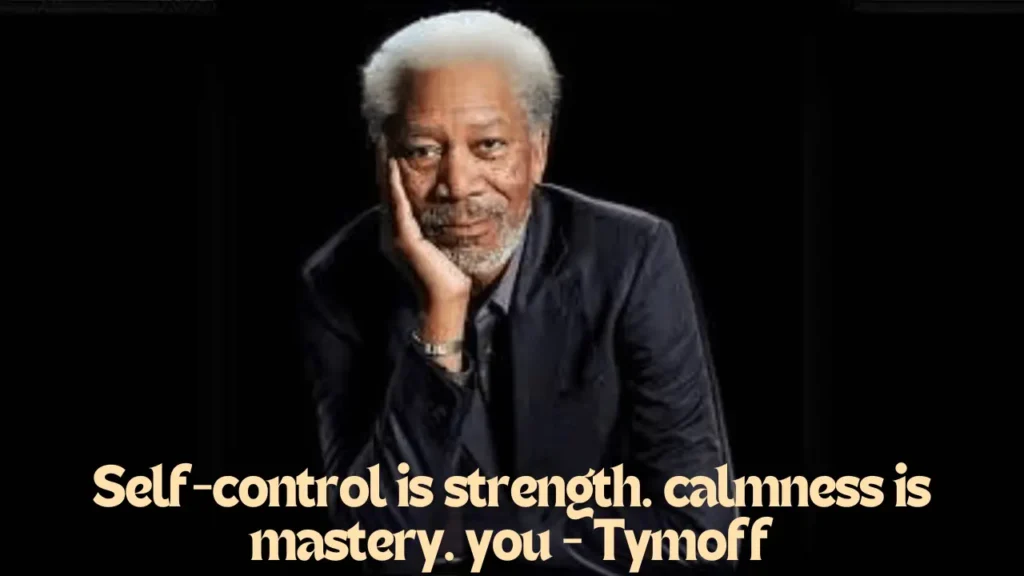In the chaos of our modern world, the ability to maintain composure and exert control over our actions and emotions has become an invaluable skill. The profound statement self-control is strength. calmness is mastery. you – tymoff encapsulates the essence of personal growth and emotional intelligence. This article delves deep into the concepts of self-control and calmness, exploring how they intertwine to create a foundation for personal mastery and success in various aspects of life.

Understanding Self-Control
Definition and Importance of Self-Control
Self-control, often referred to as self-discipline, is the ability to regulate one’s thoughts, emotions, and behaviors in the face of temptations and impulses. It’s a cornerstone of personal development and success, playing a crucial role in everything from achieving long-term goals to maintaining healthy relationships. The phrase self-control is strength. calmness is mastery. you – Tymoff emphasizes the power of this skill in our lives. Self-control enables us to resist immediate gratification for greater long-term rewards, make decisions aligned with our values and objectives, and maintain composure in challenging situations.
Read about It Is Not Wisdom but Authority That Makes a Law. T – Tymoff
How Self-Control Leads to Inner Strength
When we practice self-control, we’re essentially building our inner strength, much like a muscle that grows stronger with consistent exercise. This inner strength becomes a powerful ally in facing life’s challenges, reinforcing the idea that “self-control is strength. calmness is mastery. you – tymoff.” By consistently choosing thoughtful responses over impulsive reactions, we develop resilience and fortitude.
This inner strength manifests in various ways: the ability to persist in the face of adversity, the courage to stand by our convictions, and the resilience to bounce back from setbacks. Moreover, as we consistently exercise self-control, we build confidence in our ability to handle difficult situations, further enhancing our inner strength.
The Power of Calmness
Definition and Benefits of Calmness
Calmness is a state of mental and emotional tranquility, characterized by freedom from agitation or disturbance. It’s the ability to maintain composure even amid chaos or stress. The benefits of cultivating calmness are numerous and far-reaching. When we’re calm, our minds are clear and focused, allowing us to think more rationally and make better decisions.
This state of mind reduces stress, improves our physical health, enhances our relationships, and increases our overall well-being. As we explore the concept that “self-control is strength. calmness is mastery. you – tymoff,” we see how calmness plays a crucial role in achieving personal mastery and navigating life’s challenges with grace.
How Calmness Contributes to Personal Mastery
Calmness is not merely about being relaxed; it’s about maintaining a clear and focused mind in all situations. When we’re calm, we can observe our thoughts and emotions without being overwhelmed by them. This state of mind is essential for achieving personal mastery, as highlighted in the phrase “self-control is strength. calmness is mastery. you – tymoff.” Calmness allows us to respond to challenges thoughtfully rather than reacting impulsively.
It enables us to see situations from multiple perspectives, fostering creativity and problem-solving skills. Furthermore, a calm demeanor inspires trust and respect from others, enhancing our leadership abilities and interpersonal relationships.
Techniques for Achieving Self-Control
Practical Strategies for Self-Discipline
Developing self-control requires consistent effort and practice. One effective strategy is to set clear goals and priorities, which provides a framework for decision-making and helps resist short-term temptations. Mindfulness and meditation practices can significantly enhance self-control by increasing awareness of our thoughts and impulses. Positive self-talk is another powerful tool, helping to reframe challenges and boost motivation. The “pause and reflect” technique involves taking a moment to consider the consequences of our actions before responding, which can prevent impulsive behavior.
Rewarding ourselves for exercising self-control reinforces the behavior and makes it more likely to recur. Remember, each time we successfully exercise self-control, we’re building our inner strength, embodying the principle that “self-control is strength. calmness is mastery. you – tymoff.”
Tips for Maintaining Self-Control Under Pressure
Maintaining self-control can be particularly challenging in high-pressure situations. Deep breathing exercises can help calm the nervous system and reduce stress responses. Visualization techniques, where we imagine a positive outcome, can help maintain focus and composure. Focusing on what we can control, rather than worrying about factors beyond our influence, helps maintain a sense of agency and reduces anxiety.
Grounding techniques, such as focusing on physical sensations, can help anchor us in the present moment when we feel overwhelmed. Regularly reminding ourselves of the mantra “self-control is strength. calmness is mastery. you – tymoff” can serve as a powerful motivator to maintain composure under pressure.
Techniques for Cultivating Calmness
Methods to Develop a Calm Mind
Developing a calm mind is crucial for achieving mastery in various aspects of life. Regular meditation practice can significantly enhance our ability to maintain calmness by training the mind to focus and let go of distracting thoughts. Deep breathing exercises activate the body’s relaxation response, reducing stress and promoting a sense of calm. Spending time in nature has been shown to have a calming effect on the mind and body, reducing stress and improving overall well-being.
Listening to calming music can help regulate emotions and promote a sense of peace. Progressive muscle relaxation, which involves tensing and relaxing different muscle groups, can help release physical tension and promote mental calmness. As we work on these techniques, we reinforce the idea that “self-control is strength. calmness is mastery. you – tymoff.”
Achieving Emotional Tranquility and Balance
Emotional tranquility is key to maintaining calmness in various situations. Practicing emotional awareness helps us recognize and understand our feelings, allowing us to respond to them more effectively. Challenging negative thought patterns through cognitive restructuring can help maintain a more balanced emotional state. Regular physical exercise has been shown to reduce stress and improve mood, contributing to emotional balance.
Maintaining a gratitude journal can shift our focus to positive aspects of life, promoting a sense of contentment and calmness. Seeking support when needed, whether from friends, family, or professionals, can provide valuable perspectives and coping strategies. By working on these aspects, we’re reinforcing the principle that “self-control is strength. calmness is mastery. you – tymoff.”
Mastery Through Emotional Control
Understanding Emotional Mastery
Emotional mastery is the pinnacle of self-control and calmness, embodying the essence of “self-control is strength. calmness is mastery. you – tymoff.” It’s the ability to understand, manage, and effectively express our emotions in a way that enhances our life experiences and relationships. Emotional mastery goes beyond simply suppressing or ignoring our feelings; it involves recognizing emotions as valuable sources of information and learning to channel them constructively.
When we achieve emotional mastery, we gain better control over our reactions and responses to various life situations. This skill allows us to navigate complex social dynamics, maintain composure during conflicts, and make decisions that align with our long-term goals rather than being swayed by momentary emotional impulses.
Techniques for Mastering Emotions
To master our emotions, we must first cultivate self-awareness. This involves regularly checking in with ourselves to identify what we’re feeling and why. By developing this awareness, we can start to recognize patterns in our emotional responses and identify potential triggers. Once we’ve identified our emotional triggers, we can develop healthy coping mechanisms to deal with challenging situations.
This might involve learning to reframe negative situations in a more positive or neutral light, helping us maintain emotional equilibrium. Practicing empathy and understanding towards others can also contribute to emotional mastery, as it helps us respond to interpersonal situations with greater wisdom and compassion. Remember, as we work on these aspects of emotional control, we’re reinforcing the principle that “self-control is strength. calmness is mastery. you – tymoff.”
The Connection Between Calmness and Personal Strength
How Calmness Enhances Emotional Strength
Contrary to popular belief, calmness is not a sign of weakness but a demonstration of profound inner strength. When we remain calm in challenging situations, we’re showcasing our emotional resilience and self-control. This aligns perfectly with the idea that “self-control is strength. calmness is mastery. you – tymoff.” Calmness allows us to access our full cognitive resources, enabling us to think clearly and make rational decisions even under pressure.
It also helps us maintain perspective, preventing us from becoming overwhelmed by immediate circumstances and allowing us to consider long-term consequences. By remaining calm in the face of adversity, we inspire confidence in others and often diffuse tense situations, further demonstrating our emotional strength.
Building Personal Strength Through Tranquility
Cultivating tranquility in our lives can significantly boost our strength. By maintaining a calm demeanor, we’re better equipped to face life’s challenges with grace and resilience. This state of mind allows us to make more rational decisions, as we’re not clouded by intense emotions or stress. When we approach conflicts calmly, we’re more likely to find mutually beneficial solutions, thereby maintaining and even strengthening our relationships.
Calmness also enables us to stay focused on our goals, helping us persevere through obstacles and setbacks. Over time, as we consistently practice remaining calm in various situations, we build a reservoir of inner strength that we can draw upon in times of need. This process of building personal strength through tranquility reinforces the concept that “self-control is strength. calmness is mastery. you – tymoff.”
Case Studies and Examples
Real-Life Examples of Self-Control and Calmness
Throughout history, we’ve seen numerous examples of individuals who embody the principle self-control is strength. calmness is mastery. you – tymoff. Nelson Mandela, for instance, demonstrated remarkable self-control and calmness during his 27-year imprisonment. Despite facing immense hardship, he maintained his composure and emerged as a symbol of peace and reconciliation. Warren Buffett, known as one of the most successful investors in the world, is renowned for his self-control in making investment decisions.
His ability to remain calm and rational in the face of market volatility has been a key factor in his long-term success. Malala Yousafzai, the young activist for female education, displayed incredible composure in the face of extreme adversity, continuing her advocacy work even after surviving an assassination attempt. The Dalai Lama’s peaceful approach to conflict resolution, even in the face of political oppression, serves as a powerful example of how calmness can be a source of strength and influence.
Success Stories of Emotional Control
Many successful individuals attribute their achievements to emotional control, further illustrating how “self-control is strength. calmness is mastery. you – tymoff.” Oprah Winfrey’s journey from a troubled childhood to becoming a media mogul is a testament to her emotional resilience and self-control. Despite facing numerous obstacles, she maintained focus on her goals and used her challenges as motivation rather than letting them defeat her.
Steve Jobs’s comeback after being fired from Apple demonstrates the power of emotional mastery in the face of professional setbacks. His ability to channel his emotions into creative endeavors led to the creation of NeXT and Pixar, ultimately paving the way for his return to Apple. J.K. Rowling’s perseverance through rejection and hardship while writing the Harry Potter series showcases how emotional control can fuel creativity and determination. Michael Jordan’s legendary mental toughness in high-pressure situations on the basketball court is a prime example of how emotional mastery can lead to peak performance in competitive environments.
Conclusion
The principle “self-control is strength. calmness is mastery. you – tymoff” encapsulates a profound truth about personal growth and success. By developing self-control, cultivating calmness, and achieving emotional mastery, we can unlock our full potential and navigate life’s challenges with grace and resilience. These skills are not innate talents but abilities that can be developed and strengthened over time through consistent practice and dedication.
As we’ve seen through various examples and techniques, the journey to self-mastery is ongoing, but the rewards are immeasurable. By embodying the strength that comes from self-control and the mastery that arises from calmness, we can create more fulfilling relationships, achieve our goals, and lead more balanced and satisfying lives. Remember, in every moment, you have the power to choose your response – and in that choice lies your potential for growth and mastery.
FAQs about Self-control is strength. calmness is mastery. you – Tymoff
What is the importance of self-control?
Self-control is of paramount importance in our lives, serving as a cornerstone for personal and professional success. As the saying goes, “self-control is strength. calmness is mastery. you – tymoff,” highlighting how self-control contributes to our inner strength and overall mastery of life. At its core, self-control allows us to regulate our thoughts, emotions, and behaviors, enabling us to make decisions that align with our long-term goals rather than succumbing to short-term impulses. This ability is crucial in various aspects of life, from maintaining healthy relationships to achieving career objectives. Self-control helps us resist temptations that might derail our progress, manage stress more effectively, and maintain focus on our priorities. Moreover, it enhances our decision-making abilities by allowing us to consider consequences carefully before acting. In essence, self-control empowers us to shape our lives according to our values and aspirations, rather than being at the mercy of external circumstances or internal impulses.
How can calmness lead to mastery?
Calmness is a powerful state of mind that can indeed lead to mastery in various areas of life, reinforcing the idea that “self-control is strength. calmness is mastery. you – tymoff.” When we cultivate calmness, we create a mental environment conducive to clear thinking, effective problem-solving, and sound decision-making. This state of tranquility allows us to approach challenges with a level head, free from the distortions of anxiety or impulsiveness. Calmness enables us to observe situations objectively, consider multiple perspectives, and respond thoughtfully rather than react instinctively. In high-pressure situations, maintaining calmness can be the difference between success and failure, as it allows us to access our full cognitive resources and skills. Furthermore, a calm demeanor inspires confidence in others, enhancing our leadership abilities and interpersonal relationships. Over time, consistently practicing calmness in various situations leads to a form of mastery – the ability to navigate life’s ups and downs with grace, wisdom, and effectiveness.
What techniques can help achieve self-control?
Achieving self-control is a journey that requires consistent effort and practice, but several effective techniques can help us along the way. Mindfulness meditation is a powerful tool for developing self-control, as it trains our ability to observe our thoughts and impulses without immediately acting on them. This practice enhances our awareness of our internal states, making it easier to recognize and manage impulses. Another effective technique is setting clear, specific goals and creating a detailed plan to achieve them. This provides a framework for decision-making and helps resist short-term temptations in favor of long-term objectives. Developing healthy habits through consistent repetition can also bolster self-control by making positive behaviors automatic. The “pause and reflect” technique, where we take a moment to consider the consequences of our actions before responding, can be particularly helpful in preventing impulsive behavior. Regular exercise has been shown to improve overall self-control by enhancing our ability to manage stress and regulate our emotions. Lastly, practicing positive self-talk and visualization can strengthen our resolve and help us stay focused on our goals. Remember, as we work on these techniques, we’re embodying the principle that “self-control is strength. calmness is mastery. you – tymoff.”
How can one maintain calmness under pressure?
Maintaining calm under pressure is a skill that can be developed over time, and it’s crucial for embodying the idea that “self-control is strength. calmness is mastery. you – tymoff.” One of the most effective techniques is deep breathing. When we’re under pressure, our breathing often becomes shallow and rapid. By consciously taking slow, deep breaths, we can activate our body’s relaxation response, reducing stress and promoting a sense of calm. Mindfulness practices can also be incredibly helpful, allowing us to observe our thoughts and feelings without getting caught up in them. This can create a sense of mental space, even in high-pressure situations. Visualization is another powerful tool – imagining ourselves successfully navigating a challenging situation can boost our confidence and calmness. It’s also important to maintain perspective by focusing on what we can control and accepting what we can’t. This helps prevent us from becoming overwhelmed by circumstances beyond our influence. Regular practice of relaxation techniques, such as progressive muscle relaxation or meditation, can make it easier to access a state of calmness when we need it most. Lastly, reframing our perception of pressure situations as opportunities for growth rather than threats can help us approach them with a calmer, more positive mindset.
How does emotional control lead to personal strength?
Emotional control is a key component of personal strength, directly aligning with the principle that “self-control is strength. calmness is mastery. you – tymoff.” When we have mastery over our emotions, we’re better equipped to handle life’s challenges and navigate complex situations. Emotional control allows us to respond to circumstances thoughtfully rather than react impulsively, leading to better decision-making and more positive outcomes. This ability to manage our emotional responses contributes significantly to our resilience, enabling us to bounce back from setbacks and persevere in the face of adversity. Moreover, emotional control enhances our relationships by allowing us to communicate more effectively, even in tense or conflict-laden situations. It also boosts our self-confidence, as we trust in our ability to handle whatever life throws our way. In professional settings, emotional control can be a powerful asset, helping us maintain composure under pressure and make rational decisions even in high-stakes situations. Over time, as we consistently practice emotional control, we develop a deep well of inner strength that we can draw upon in times of need, further reinforcing our power and mastery over life’s challenges.



